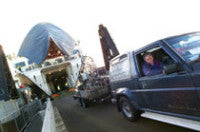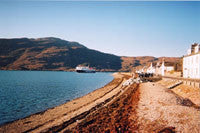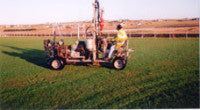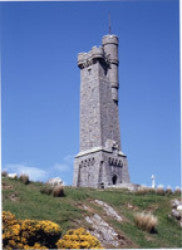Never on Sunday
NEVER ON SUNDAY
By Carol Dutton
Following a request from the Western Isles Council based in Stornoway on the Isle of Lewis, Terrain Aeration Services took their new hydraulic Terralift machine "Airforce" to the Outer Hebrides. Two, three hour ferry crossings, 1,280 land miles, a broken gearbox, burst tyre, hired road breaker compressor, wayward BT ISDN line and 72 hours of force nine gales later, both men and machine returned triumphant to Haughly in Suffolk, where the company are based. "Airforce" treated eight acres of municipal sports field and an entire school football pitch in 11 days, adhering to the strict Island rule of "no work on Sunday."
Here starts an account of their epic journey.
 . Feb.
. Feb.
In the beginning, all was well. Apart from a flat tyre on the Daihatsu, and a fault on the trailer lights, (which called for repairs at the roadside between Lanarkshire and Glasgow) the 160 mile first leg to Ullapool went without incident. Severe gale warnings, which threatened to cancel the ferry crossing to Stornoway proved unfounded, and Terrain Aeration Services' M.D. David Green, accompanied by his machine operator Rob, with Airforce in tow, caught their 10.10am crossing. The Lytag (to be used for back filling), ordered from Eggborough, and travelling by road to Ullapool, via Inverness, caught the same ferry, and all arrived on time in Stornoway, to be met at the dockside by Mr. James MacArthur (Senior Technician, technical services department, Western Isles Council), Murdo Murray, Clerk of Works and the Island's lady photographer. Acres Pitch, some 12,720 sq. metres of Local Authority owned sports ground was half a mile from the dockside.
Tuesday 25th Feb.
"The site, (not the most scenic on this beautiful Island) proved to be a peat bog capped with poor quality turf," recalls David. "Some drainage had been installed in the 1970s according to a chat with the locals, but it was clearly ineffective and the ground was wet and spongy throughout. Most of the lower half of the slightly sloping field had a substantial and vigorous moss cover, up to 90 per cent in places. There is no established routine care for this area apart from cutting, mainly because it is so soft for most of the year that maintenance equipment sinks in the mire. As the weather dictates that winter sports here are played in Summer, and there was ample time before the start of the new season, we decided to contact Steve Isaacs the STRI's Scottish agronomist and put him in touch with James MacArthur. Once we had finished, the ground would need to be heavily sanded, re-seeded, treated to suppress the moss, fertilised and most importantly aerated on a regular basis."
Having furnished the council with a risk assessment, insurance documents and the company's method statement, David was informed that the only underground service was a sewer pipe. Noticing what looked like a BT telephone cable coming out of the Royal Mail warehouse next door and disappearing underground beneath Acres Pitch, he made further inquiries only to discover that the offending cable was the main ISDN line link for the Island. Had it remained unnoticed and been punctured by Airforce, a large sector of the business community on Lewis would have come to a standstill!
Having marked out Acres pitch using white nylon cord, running the full width of the area, to ensure that all aeration was conducted at two metre spacings on a staggered grid pattern, men and machine completed a full days work.
Wednesday 26th Feb.
After an 8.30am start, the team had completed a further 16 rows (25 per cent of the sports field) before disaster struck. At 3.30pm Airforce stopped compressing air, due to a broken gearbox. Although the team had brought spares, these did not include a gearbox, and they rushed to the two and a half miles to the airport to get the broken part onto the afternoon flight to Glasgow. Airport officials informed David that at 50Kg, the £500 worth of gearbox needed to be fixed securely to a pallet and suitably wrapped before it would be allowed onto a plane. David returned to site at Stornoway, and found a pallet, which Murdo cut to size and drilled with suitable boltholes. Once wrapped and secure, the gearbox was again rushed to the airport, where it finally left for Glasgow. From here it will fly to Birmingham before being carried by road to the manufacturers in Cardiff.
Thursday 27th Feb.
The broken gearbox arrived at Birmingham airport at 9.30am. and was transferred to the cargo area at the Old Airport site. The courier company engaged to take it to Cardiff, first couldn't find the depot and then had to wait one hour and 15mins while the package was located. With a three to three and a half hour drive to Wales still to be accomplished, David Green's wife Lynda, co-ordinating operations from Suffolk was beginning to doubt whether the repaired gearbox would be back on Lewis before Monday.
"My heart was pounding away with this huge adrenaline rush," she says, "and I remember thinking - I hope this means a weight loss, but in reality the only "weight loss" is likely to be about £1,000 to £2,000!"
Back on the Island David and Rob had decided to use their unexpected free time to investigate other sports fields for possible future aeration work, and they travelled to Harris at the other end of the Island.
"The road goes straight up for 25 miles on a single track," says David, "there's no way we could take "Airforce on the trailer. The only way to get there would be by boat."
Having been asked by the council if the company could use the local seaweed, (which is injected by Airforce during the aeration process, to add nutrients), David popped in to visit his supplier, situated at a remote location in Keose. It was here that he had his first hint of the seriousness with which the Hebrideans take their Christianity.

On the mainland, the chances of the gearbox returning to Stornoway before the weekend were looking increasingly remote. The couriers had not arrived in Cardiff until 3.55pm. and the spare part needed for repairs would not be there until 10.00am the next day. All hopes of the gearbox making the 4.30pm flight out of Birmingham on Friday were dashed.
At this point David and Rob hired a road breaker compressor to get air into Airforce's compressor tanks and continue work.
"Airforce has a direct belt drive from the engine output shaft to drive its hydraulics, so all the rams, wheel drives and hammer were still working," David explains. "In a previous version of the machine a tow behind compressor had been considered and a tow ball fitted, which was still in place. The standard road breaker compressor was simply connected to the tow ball and one of its supply lines was connected to Airforce's main airline. Once started the compressor only supplied 8 bar, but investigation revealed a control valve, which, when adjusted gave 11 bar. We used both air tanks and work began again."
Friday 28th. Feb.
The road breaker unit was being towed behind Airforce, which gave a total combo length of 26ft. Nevertheless aeration continued at Acres pitch, albeit at a slower pace, and the team were confident that they were within their time schedule. At 10.00am. another problem arose. The council workers, employed to follow the aeration process and backfill the probe holes with Lytag, complained of feelings of nausea. As this was their first encounter with the material they blamed Lytag for their condition although it is a processed waste material, double fired, chemically inert, and disease and growth free. Lynda faxed a COSHH sheet through to the council on Lewis, and the cause of the problem was diagnosed as anaerobic conditions beneath the pitch.
"The soil construction on this site is peat over peat over peat, to a depth of six metres" reports David. "The existing ditches on two sides of the area are blocked and stagnant, and run off water drains from the roofs and concrete storage yards surrounding the other two sides, straight onto the pitch, which is already waterlogged and anaerobic. A ditch will need to be dug right round the perimeter to drain this excess water. As the present anaerobic layer was being opened to the air for the first time, Hydrogen Sulphide was released (smelling of rotten eggs) and rising through the probe holes as the workers backfilled."
David will give the council a full report before he leaves, while Steve Issacs (STRI) has passed information to his colleague who is familiar with soil conditions on the Islands.
By lunchtime, work had resumed on the island, and the repaired gearbox was ready to be transported to Birmingham airport to catch the 6.00pm flight to Glasgow. It will stay here overnight before catching the Saturday ferry to Stornoway.
As David and Rob continued to aerate Acres pitch, the courier on his way to pick up the repaired gearbox had a puncture, and the gearbox missed the plane. As Lynda re arranged the booking for 7.05pm. she was aware that this was the final flight of the day to Glasgow. The precious package made it.
Saturday 1st. March.
Having completed aeration on two thirds of Acres pitch, David and Rob continued with their Airforce/compressor unit combo, working in shifts to keep on schedule. David left for the cargo office at Stornoway airport to pick up the repaired gearbox and returned to find that the hired compressor had died at 2.00pm. By 2.30pm. Airforce was up and running, complete with repaired gearbox, and the team, having started work at 7.00am. decided to call it a day.
Sunday 2nd March
According to Island rules, the only person working today is the Stornoway street cleaner who begins at 7.00am. Even the fountain is switched off.
Monday 3rd March
The aeration of Acres Pitch is completed, Airforce is taken off site, checked and loaded onto the trailer, before travelling the 10 miles to Back football pitch, in Upper Coll in the afternoon.
Tuesday 4th March
Men and machine arrived on site at Upper Coll, and the weather, which up until now has been perfect with brilliant sunshine, began to turn dull.
Wednesday 5th March
Despite gale force winds and heavy rain during the morning, progress at Back pitch is encouraging, and David is pleased with results. "Following the rain the pitch surface was very wet in patches, but after aeration these areas dried and became firm," he remembers.
Anxious to get ahead of schedule in case they are held up by the weather, the team decide to continue work today for as long as possible. Terrain Aeration Services are to aerate the entire playing area.
Thursday 6th March
Work started at 7.00am. in high winds and horizontal rain. The team are aware of snow reports from the USA and don't want to get stuck on the Island, or bogged down with bad weather on mainland Scotland. More rain and gale force winds are forecast.
Friday 7th March
Aeration continues although progress is impeded by bad weather conditions. Apart from one part of the pitch that was previously swamped by high tides, the original playing surface was free draining. Heavy machinery, and the delivery and grading of several thousand tonnes of sand, (used to raise the surface height above high tide level) has resulted in severe localised compaction, overlying anaerobic conditions beneath.
Saturday 8th March
Back pitch was completed at 11.00am. and amid brilliant sunshine, men and machine caught the 1.15pm. ferry from Stornoway, back to Ullapool.
For further information on the deep aeration services offered by T.A.S. contact the company on Tel: 01449 673783 or e-mail terrainaeration@aol.com